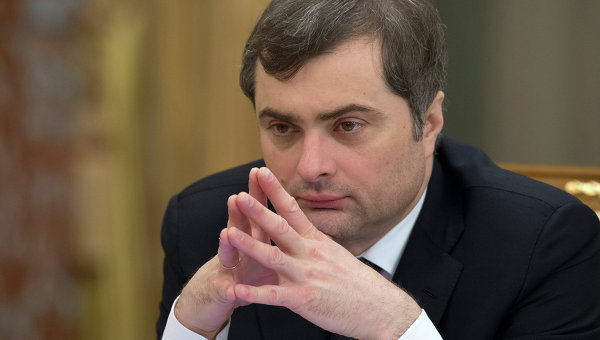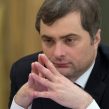
Surkov and Gryzlov: Russia’s New Negotiators on Ukraine (Part One)
Publication: Eurasia Daily Monitor Volume: 13 Issue: 34
By:

Russian President Vladimir Putin has recently appointed Vladislav Surkov and Boris Gryzlov to negotiate—in two separate formats—an outcome to Russia’s war in Ukraine’s east (Censor.net.ua, January 15, 2016; TASS, December 26, 2015). Surkov and Gryzlov have long-standing personal ties to Putin and will report to him on their new assignments.
Both Surkov and Gryzlov are blacklisted by the European Union, the United States and Ukraine as part of sanctions over Russia’s annexation of Crimea (prior to Russia’s military intervention in Ukraine’s east, in which they also played senior roles). The fact that the EU, the US as well as Ukraine have accepted them as negotiating counterparts without further ado, marks a tactical and psychological success for the Kremlin. It suggests that the other parties are more anxious to compromise than the Kremlin is (or shows itself to be). It also signifies, practically and tacitly, an exemption of these Kremlin officials from sanctions, although the sanctions against them remain valid de jure.
Surkov and Gryzlov replace professional diplomats from the Foreign Affairs Ministry in two ongoing processes: bilateral consultations with the US State Department on Ukraine and the Minsk Contact Group on Ukraine, respectively. Foreign Affairs Minister Sergei Lavrov remains the public face and articulator of Moscow’s policy on Ukraine in the “Normandy” group (Russia, Germany, France, Ukraine) and in meetings with his US counterpart John Kerry. However, the parallel appointments of Surkov and Gryzlov signify that the Kremlin is taking over control of the negotiations from the Foreign Affairs Ministry.
The appointment of Surkov represents an investment in energizing the backchannel with US Assistant Secretary of State Victoria Nuland. He replaces Deputy Foreign Affairs Minister and State Secretary Grigory Karasin in what was hitherto the Karasin-Nuland channel. The decision to create this channel goes back to Kerry’s visit with Putin in Sochi in May 2015, which was widely criticized in Washington as overly ingratiating. It was on the same occasion that the Barack Obama administration decided to combine Ukraine with Syria in one package to be negotiated with Russia—a pairing that opens the way potentially to tradeoffs, and has distorted the bilateral US-Russia negotiations to date. The Karasin-Nuland channel, however, has not led to a breakthrough, even if it affected the Obama administration’s interpretation of the Minsk armistice: Ukraine’s political “obligations” to be fulfilled first, Russia’s possible military withdrawal to be discussed later (see EDM, July 20, 24, 31, August 10, 13, 2015).
Unlike Karasin, a conventional diplomat without decision-making authority in his own right, Surkov is a boldly creative political operator, involved in multiple aspects of Russia’s policy toward Ukraine and “frozen conflicts,” and holding some measure of decision-making authority on the Kremlin’s behalf. Formerly a deputy chief of Russia’s presidential administration (1999–2011) and deputy prime minister “for modernization” (sic, 2011–2013), Surkov is the organizer of Russia’s “sovereign democracy” (his concept) with controlled parties, fake civil-society groups, manipulative television, and public mobilization through anti-Western propaganda. In September 2013, Putin appointed Surkov as presidential aide on relations with Abkhazia and South Ossetia, and concurrently with Ukraine. There, Surkov liaised with then-president Viktor Yanukovych until the latter’s fall; selected local politicians in Crimea to be empowered in the process of the annexation; and, since September 2014, Surkov has functioned as the political supervisor (“kurator”) of the Donetsk and Luhansk “people’s republics” on the Kremlin’s behalf (International Crisis Group, February 5).
Surkov was a pariah to Western diplomats until now. Surkov and Nuland held a first meeting on January 15, in Pionersk, Kaliningrad region, which Nuland reached and left via Lithuania. Following six hours of discussions, Surkov told Russian journalists that it was a “constructive and useful brainstorming [session] in search of compromises to fulfill the Minsk agreements. Suggestions were made about constitutional changes [in Ukraine], security, and elections [in Donetsk-Luhansk] that could be taken up for discussion in the Minsk Contact Group and the Normandy format” (Interfax, January 15). The State Department similarly termed the meeting “constructive” and designed to “support the ongoing work of the Normandy format and the Minsk Contact Group (State.gov, January 16). Further, according to the State Department, “Surkov is the appropriate person [in Moscow with whom] to have this discussion about the Minsk [armistice] implementation” (The Moscow Times, January 21).
On that meeting’s eve, President Obama had called President Putin to discuss Ukraine and Syria (as a package). According to the White House’s readout, Obama “underscored that the key next step is for the sides [sic] to reach agreement on the modalities of local elections in the Donbas [Donetsk-Luhansk] region of Ukraine” (Whitehouse.gov, January 14). “The sides” so named are Kyiv and Donetsk-Luhansk coequally, legitimizing the latter while exempting Russia from responsibility. The readout did not mention a withdrawal of Russian troops or disbandment of the “people’s republics’” armed forces as prerequisites to holding elections. Nuland, while in transit in Vilnius, outlined a sequence of steps that also prioritized holding elections in Donetsk-Luhansk, to be followed by the withdrawal of “foreign military equipment” and the restoration Ukraine’s control of its border with Russia (BNS, January 15). The following day, the US embassy in Kyiv announced that it did brief top Ukrainian officials on the Nuland-Surkov meeting (Ukrinform, January 16).
Surkov paid inspection visits to Donetsk-Luhansk on January 19–20 (arriving there four days after his meeting with Nuland) and again on February 15–16. As usual, he received reports from officials of the “people’s republics” and reviewed their operations, including the use of Russia’s economic assistance. According to Ukraine’s Security Service (SBU), which monitored these visits, Surkov discussed details of preparations for local elections, aiming to stage them in mid-April (Ukrinform, Unian, February 5, 17).
Ukrainian authorities have evidence that Surkov was in Kyiv several times during the EuroMaidan events in January–February 2014, when he met with Yanukovych and the heads of state security agencies. At present, the Ukrainian General Prosecutor Office’s Directorate for Special Investigations is looking to clarify Surkov’s role in influencing the authorities of that time to use force against the Maidan protesters. The investigation seeks to determine whether Surkov provided “recommendations, guidelines, or instructions” to use force. The investigation’s findings could provide the basis for the possible prosecution of Surkov in Ukraine (RFE/RL, February 10).




